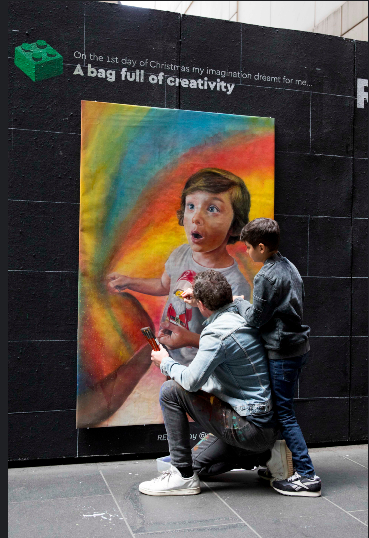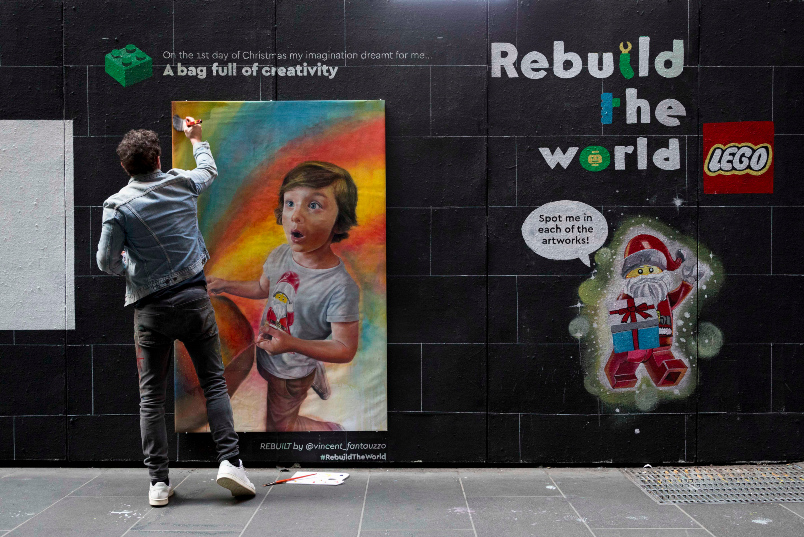Vincent Fantauzzo’s life has a storybook trajectory. Today the 42-year-old is one of Australia’s most famous artists, an Archibald Prize winner who’s married to the beautiful actor Asher Keddie. But his future didn’t always look so promising.
Vincent grew up dirt-poor in Melbourne’s Broadmeadows, sharing a two-bedroom commission house with his mother and four siblings. He left school at 13 barely able to read or write – his severe dyslexia was only diagnosed in his 20s. Consequently, Vincent got mixed up in street-fights and general delinquency; he’s even admitted to carrying a gun for a while in his teens.
Luckily, his formidable talent with a paintbrush enabled him to break free and build his successful career. But that troubled background also meant he was initially daunted by the prospect of fatherhood – Vincent has two boys Luca (10) and Valentino (4). Here he talks about fostering creativity in your children, the value of building confidence and why you don’t have to be a dad to be a father figure
“I always thought that I would be a father at some point. I really wanted to become a dad, but I was also scared, I think because I had my own difficulties growing up and there was also a bit of a panic: what if I can’t live up to the expectations that I had for myself? If I have a boy, I thought, there’s a lot of pressure there – I don’t want to set the wrong example or let them down.”
“I knew that I wanted my kids to grow up one day and say that they had a great dad. I didn’t have a lot of great male role models growing up, so I didn’t want them to have the same experience.”
“But I remember I called up Matt Moran – who’s a good mate of mine – and he was the first person I told that I was going to become a dad. Matt just said: ‘It’s going to completely turn your life upside down forever and it’s going to be the best thing that’ll ever happen to you.” And it was. Nothing has ever been the same.”
“My dad, Claudio, wasn’t a bad person. It’s just I didn’t get to develop that relationship because it just wasn’t available to me (Vincent’s parents split up when he was in Grade 6). And I think it affects everyone differently.”

“Some people aren’t fortunate enough to be able to have children biologically. But that doesn’t mean they can’t still play a really strong fatherhood role in someone’s life. Yes, being a dad changed my life. But there are people that are uncles who’ve also been changed by the experience. A boxing coach, an uncle, a friend, a cousin – they can all be fatherly figures. It’s important to acknowledge that. They can still play that fatherly role to someone in another way. Similarly, if a kid isn’t fortunate to have a biological father, he can still experience the joys of having a positive male role model in their lives.
“What advice would I give to a dad whose kid was dyslexic? From a parental perspective, it doesn’t really matter what the specific issue is – your kid might be dyslexic or have a learning disability or a weight problem. I think it’s about finding the things that make them confident and not expecting them to be able to do the ones that will never be possible for them – like maths was for me! Focus on something that your kid is good at instead. It’s about having the patience and recognising that everyone’s an individual. It’s like I loved boxing as a kid and I tried to introduce martial arts to my boys and they’re just not interested. They like playing soccer. So now I’m trying to learn how to play soccer badly. Maybe one day they’ll ask me to teach them some boxing.
“What have I found the hardest part about being a dad? I find it a lot harder to concentrate on my work because I don’t want to miss out or let them down. Sometimes I feel like I’m letting myself down work-wise because I’m putting a lot of effort into being a dad. And then it’s about trying not to be frustrated or resentful about how I’ve spent that time.
“It’s the eternal problem. You hope that being successful at work is also going to inspire your kids and make them look up to you. But not being there for a soccer game would make them feel let down. That’s a tension that I’m constantly aware of.

“There is so much Lego around our home. Just the other day, Luca and I came up with this superhero character – Val was helping us as well – and we decided to build the character’s lair using all these different bits. We ended up building for four or five hours straight. My back was killing me, I was all hunched over, getting all serious trying to find these pieces. It was just an afternoon spent building Lego. But hopefully it’ll be the sort of moment that my kids remember.
“I think the key to encouraging creativity in your kids is to keep it fun. It shouldn’t feel like homework. And ideally, if you can find something that you can enjoy doing with them yourself then do it together. But making it fun is key: if your kid’s drawing a picture, don’t tell them that the eyes are in the wrong place. Just let them draw.”
